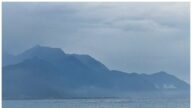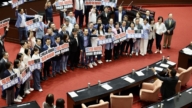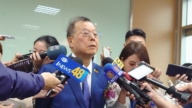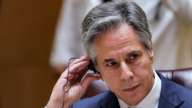【新唐人2011年8月25日讯】台湾民进党主席蔡英文8月23号提出参选明年总统的政策纲领,在“十年政纲”两岸篇,她主张,两岸政府都应该超越旧的历史框架,以追求共同利益的战略思维,改变战略对峙的态势。蔡英文重申否定“九二共识”,再度引发台湾朝野争议,马英九总统回应表示,这会对台湾造成冲击。
蔡英文22号先发表参选的政策纲领“十年政纲”总纲,又在23号公布“十年政纲”两岸篇,分为“国家安全战略篇”与“两岸经贸篇”两部分。
蔡英文表示,台湾已经是一个主权独立的国家,必须透过民主机制凝聚“台湾共识”,以“和而不同、和而求同”为基调,建构两岸新的互动架构。她重申,“九二共识”不存在。
“九二共识”是两岸在1992年香港会谈中口头协商的共识,国民党认为,其核心是“一个中国,各自表述”,也就是北京的“一中”指的是中华人民共和国,而台方的“一中”是中华民国。
蔡英文:“当时的主其事者,不论是李前总统也好,或者是辜振甫先生也好,都说没有‘九二共识’,它是一个不存在的东西,就没有所谓承认与不承认、接受与不接受的问题,要强拉整个国家在这个观念之上往前走,其实是一个不符合现代民主社会的期待。”
陆委会主委赖幸媛率先提出“十八问”,质疑蔡英文的两岸论述。民进党则反驳,两岸对“九二共识”的认知与定义不同。
马英九曾援引大陆国家主席胡锦涛与前美国总统布希的电话谈话,表示,大陆的一贯态度,就是希望大陆和台湾应该在“一中各表”的“九二共识”上,重新恢复协商,确立“九二共识”的存在。
对于北京方面认为蔡英文是“理念台独”,蔡英文说,她相信中国大陆内部仍有理性思考的力量,会成熟看待两岸关系。
民进党立法院党团总召集人柯建铭表示,蔡英文的“两岸政纲”破除了外界疑虑, 如果明年民进党执政,会接受两岸签署ECFA经济合作协议的事实,不过,未来是否要调整内容,将透过民主程序,让国会有效监督。
赖素如(国民党发言人):“我们希望她(蔡英文)更具体明确的说出她的走向,如果她不承认‘九二共识’,那她也要明确的告诉民众,两岸之间未来的发展要如何来进行。”
23号是“八二三炮战”53周年,马英九总统在金门出席“中华民国建国100年和平祈福日”活动。1958年8月23号,中共解放军对金门发动炮击,持续40多天落下47万多发炮弹,死伤军民超过2000人。
53年后一座以炮弹碎片打造的和平钟,在金门和平园区揭幕,马英九总统与诺贝尔和平奖得主、南非前总统德克勒克等外国嘉宾,共同敲响和平钟,祈愿两岸和平,世界安宁。
马英九致词时表示,他三年前上任后,提出符合台湾利益的务实主张,以“九二共识”作为基础,推动两岸和平发展,至今双方总共签署15项协议。他的“不统不独不武”政策,已经成功降低了两岸的紧张,他要为全民打造一个和平的环境。
马英九:“如果‘不统不独不武’跟‘九二共识’的政策被推翻,两岸关系必然陷入不确定的状态,对两岸都会有很大的冲击,对台湾的影响尤其重大。”
研究台湾选举的“东华大学”教授施正峰表示,民进党和国民党的两岸政策其实越来越接近,强调不接受“九二共识”至少可以区隔两党的不同之处。
施正峰:“民进党如果接受‘九二共识’,基本上就是向国民党投降,ECFA等等你看她今天的那些东西其实所讲的,跟国民党的经贸部分也没有很大的差别,提到所谓的和平稳定的框架,也差不多就是阿扁提出来的,你如果再连‘九二共识’都撤走了之后,那如何跟国民党选举的时候作区隔呢?”
英国BBC指出,从一些民调上来看,蔡英文与寻求连任的马英九势均力敌。两岸当局都声称是在“九二共识”下交流,马英九与北京都表示,民进党如果不承认“九二共识”,将使两岸交流中断。
新唐人记者李元翰、周平综合报导。
Tsai Ing-wen mentioned political progress between Taiwan and China
Democratic Progressive Party (DPP) chair Tsai Ing-wen
proposed her policy agenda for next year’s
presidential election on Aug 23.
In the Mainland-Taiwan relation section of the “Ten Year Agenda,"
she urged for the governments on both sides to step out of the
historical framework, use the pursuit of common interests as
an objective to change the current confrontational relationship.
Tsai Ing-wen reiterated her disapproval of the “1992 consensus,"
again provoking political controversy.
President Ma Ying-jeou responded that this will
impact the state of Taiwan.
Tsai Ing-wen first published her presidential candidate
“Ten Year Agenda" on August 22,
and then added the “cross-strait" chapter on August 23,
which is composed of a “national security strategy" section
and a “cross-strait economy" section.
Tsai Ing-wen expressed that Taiwan is already
an independent country and must reach a “Taiwan consensus"
through democratic mechanisms;
with “friendly but not the same, friendly with share goal"
as basis to establish a new relationship with the mainland.
She reiterated that the “1992 consensus" does not exist.
The “1992 consensus" was an oral consensus that
was reached during a cross-strait talk in Hong Kong.
The Kuomintang (KMT) believe that core of the consensus was
“One China, two interpretations."
This means for Beijing, “One China" refers to
the People’s Republic of China,
but for Taiwan, “One China” refers to the Republic of China (ROC).
Tsai Ing-wen: “The person in charge at the time,
whether it was former president Lee or Mr. Koo Chen-fu,
they all said ‘1992 consensus’ does not exist,
so there is no issue of accepting it or not.
If (we) are to forcefully drag the entire country on
this concept that doesn’t exist,
this really doesn’t not meet the expectations
of a modern democratic society."
Mainland Affairs Council Chairman Lai Shin-yuan first raised
“eighteen questions," doubting Tsai’s cross-strait agenda.
The DPP responded by saying that mainland and Taiwan
have different understanding of the “1992 consensus."
Ma Ying-jeou once quoted a conversation between Hu Jintao
and former U.S president Bush,
saying that mainland’s stance is hoping that mainland and
Taiwan restore the “1992 consensus" and accept its existence.
Regarding the fact that Beijing believe that Tsai wants
“the concept of independent Taiwan,"
Tsai expressed that she believe the mainland government
can also think rationally,
and look at the cross-strait relations maturely.
DPP Legislative Yuan convener Ker Chien-ming expressed,
Tsai’s “cross-strait" agenda removed the outside doubts.
If the DPP wins the election next year, it will still sign
the ECFA cooperation agreement with the mainland.
However, as to whether the content will be modified,
that will be determined by a democratic process,
so it can be effectively supervised.
Lai Suru (KMT spokeswoman),
“We hope that she (Tsai) explain her direction in more detail,
if she does not recognize ‘1992 consensus,’
then she need to tell the people,
how will the cross-strait relationship develop in the future."
The 1958 bombing’s 53rd anniversary was on Aug 23.
President Ma Ying-jeou attended the “Republic of China
100 years of peace prayer day" activities in Jinmen.
On Aug 23, 1958, Chinese Communist Party (CCP) forces
bombarded Jinmen continuously for 40 days.
They fired 470,000 shells, which killed more than 2,000
civilians and military personals.
After 53 years, a peace bell was built using remains of
bomb shells and revealed in Jinmen.
President Ma Ying-jeou sounded the peace bell together
with Nobel Peace Prize winner and former South African
President F. W. de Klerk and other foreign guests,
praying for the cross-strait peace and the world peace.
President Ma expressed in his speech,
that when he took office three years ago,
with Taiwan’s interests in mind and
with “1992 consensus" as the basis,
he promotes cross-strait development,
which has led to signing of 15 different agreements.
His “no unification, no independence, no war" policy had
successfully reduced the tension between
mainland and Taiwan and created a peaceful environment.
Ma Ying-jeou: “If ‘no unification, no independence,
no war’ and ‘1992 consensus’ are overturned,
the cross-strait relationship will fall into uncertainty,
this will greatly impact both sides, especially Taiwan."
The Taiwan election scholar, Professor Shi Zhengfeng
from Donghua University expressed that,
the cross-strait policy of the DPP and KMT
are getting very similar,
not accepting the “1992 consensus" can at least
keep some difference between the two parties.
Shi Zhengfeng: “If DPP accepts the ‘1992 consensus,’
that’s like surrendering to the KMT;
things like ECFA that she talked about today;
it’s very similar to the economic aspects of the KMT.
Regarding the peace structure,
it’s also very close to what Chen Shui-bian said.
If she backs down on the ‘1992 consensus,’
then what is the difference, comparing to the KMT?"
British CCP pointed out, based on some opinion polls,
Tsai Ing-wen and Ma Ying-jeou are evenly matched.
Both mainland China and Taiwan say
they are communicating under the “1922 consensus."
Both Ma Ying-jeou and Beijing expressed that,
if DPP does not recognize the “1922 consensus,”
then their cross-strait relation will end.
NTD reporters Li Yuanhan and Zhou Ping.































